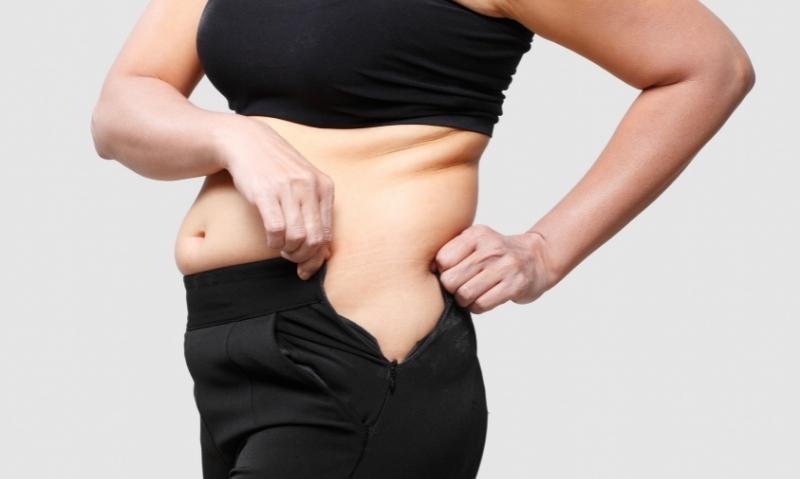
A ketogenic diet is high-fat, low-carb, and moderate in protein.
It primarily involves replacing most of the carbohydrates in the diet with fat.
In a sense, this tricks the body into thinking it is in a fasting state and it begins to utilize fat stores and ketones as primary fuel sources, instead of glucose.
This metabolic shift towards fat burning and producing ketones is called ketosis.
If you’ve just started a ketogenic diet you might have wondered how long it will take to get into ketosis.
The answer is not as clear as you might think since there is a multitude of factors that affect the length of time it takes to enter ketosis.
How Long Does It Take to Get Into Ketosis?
Before starting on a keto diet, there are some boxes to check.
First, verify with your physician that it is safe for you to be on a ketogenic diet considering your medical and medication history.
Second, consult with a nutrition professional that can help you plan a well-formulated ketogenic diet that meets your nutritional needs.
In order to make sure your diet meets your macro and micronutrient needs, a dietitian will take into account your:
- Age
- Gender
- Metabolism
- Body composition
- Physical activity level
- Lifestyle
- Overall health
- Weight loss goals, etc.
Additionally, they can evaluate your labs, and help you manage any side effects.
How long it takes to achieve and maintain a state of ketosis is highly individualized. Some people enter ketosis fast, in as little as 2 days.
For others, getting into ketosis takes longer.
Ketosis can be affected by many things: your carb intake, fat intake, protein intake, overall diet, energy needs, exercise, stress, sleep, and body composition.
One of the most significant factors that affect the time it takes to get into ketosis is carbohydrate restriction.
The carbohydrate restriction needed to enter ketosis and the length of time it takes to get into ketosis varies from person to person.
If you are just starting out on a keto diet it is wise to start with more carbs and decrease the amount over a period of days until you enter ketosis.
This will help your body adjust to ketosis faster with minimal side effects.
If your body is used to 200-300 grams of carbs per day, it would be a huge shock to all of a sudden switch to 30 grams per day.
A better plan is to start somewhere around 100 grams, then work down to 75 grams, and eventually work down to 50 grams of carbs per day.
You may find this is enough of a restriction to see results.
How to Test for Ketones
The most reliable and accurate way of checking if you’re in ketosis is to measure ketone levels in the blood.
Blood Glucose Meter Testing
This can be done by using a blood glucose meter that has been designed to test for ketone levels.
A person in nutritional ketosis will have blood ketone levels of 0.5 to 3 mg/dL (1).
Urine and Breath Testing
You can also use urine and breath tests to check ketone levels but these methods are less reliable than blood tests.
Blood, urine, and breath tests can be done at home or in a doctor’s office.
Signs That You’re in Ketosis
You don’t have to test for ketone levels to be on a ketogenic diet.
There are some common signs and symptoms that may indicate that you’re in ketosis. Some people experience mild symptoms like bad breath and irritability.
Others experience the “keto-flu” as their body adapts to nutritional ketosis.
The symptoms of the “keto-flu” are constipation, headache, bad breath, muscle cramps, diarrhea, general weakness, and rash (5).
These adverse effects should not last more than 1-2 weeks.
Staying hydrated and getting enough electrolytes may help you avoid some or all of these negative symptoms.
Once your body adjusts to nutritional ketosis, you should notice an increase in positive effects, such as reduced hunger cravings, weight loss, and over time, an improvement in energy.
10 Tips to Enter Ketosis Faster
Many people are drawn to a keto diet because they want to lose weight quickly and they want to know how to get into ketosis fast.
Keep in mind that getting into ketosis too quickly and not giving your body time to adjust can backfire and lead to adverse effects.
Giving your body time to adjust to ketosis, staying hydrated, and making sure you are getting enough electrolytes can help you avoid adverse effects like the “keto flu.”
As you give your body time to get into ketosis, here are some tips that can help you along the way.
- Work with a dietitian who can help you plan a keto meal plan with the appropriate macronutrient amounts that will switch your body into a state of ketosis. This is an important step because if your carb intake is too high, you won’t get into ketosis. Also, if your daily energy and nutrient needs are not being met, then the diet won’t be sustainable.
- Prepare your meals at home. This way you have complete control over what’s going into your food.
- Avoid eating out, unless the restaurant you visit has keto-friendly options on the menu. It’s difficult to keep track of your carbohydrate intake if you eat out.
- Check the labels of everything you use. Many foods contain added sugars, especially sauces, salad dressings, and condiments.
- Make sure you are eating enough fat. A general goal of a ketogenic diet is that about 70% of your calories should come from fat. Make sure to choose healthy sources of fat from whole foods, such as avocados, nuts, seeds, olive oil, coconut, olives, full-fat greek yogurt, and fat-rich fish like salmon, cheese, butter, and eggs.
- Limit protein to about 20% of your total calories. The ketogenic diet is not a high-protein diet. Too much protein can prevent ketosis.
- Get adequate exercise. Exercise utilizes glycogen stores and speeds up your metabolism, which can shorten the time it takes to get into ketosis.
- Limit stress. The main stress hormone in the body, cortisol, impairs the process of ketosis by increasing blood sugar, which in turn increases insulin production and suppresses ketone production.
- Get adequate sleep. Proper sleep helps the body run efficiently, boosts metabolism, and reduces stress.
- Supplement with MCT oil. Medium-chain triglycerides are easily digested by the human body and can be used as a quick source of energy or they can be converted into ketone bodies.
Will One Cheat Day Ruin Ketosis?
As with any diet, it’s best not to use negative terms like “cheating” or “ruining” when it comes to your food intake.
Maintaining weight loss can be difficult with this type of mentality and can lead to frustration, guilt, and disappointment.
Ideally, the diet you follow is one that is nutrient-dense, manageable, sustainable, and fits well as part of an overall healthy lifestyle—especially if your goal is to lose weight and keep it off for the long term.
With that being said, life happens and there will be days when your diet changes and that’s ok.
If you choose to eat something that is not part of your keto meal plan, then enjoy it and move on. It’s the overall long-term adherence to a healthy lifestyle that matters most.
How Long Should I Be on a Keto Diet?
The length of time someone should be on a ketogenic diet is a controversial topic.
Some sources indicate a keto way of eating can be followed for a minimum of 2 to 3 weeks up to 6 to 12 months (3).
If you are new to a keto diet, plan on giving your body a few weeks to adjust.
This doesn’t mean you will be in ketosis the entire time.
Your body will naturally cycle in and out of ketosis.
At some point, it will be important to increase the amount of nutrient-dense carbohydrates in your diet.
The goal is to transition to a sustainable, nutrient-dense, lower-carb diet that can be followed for the long term.
Last Words
The time it takes to get into ketosis is different for everybody. It can take 2 days for one person to enter ketosis, while it takes 10 days for another person.
Various factors affect how long it takes to get into ketosis, such as body composition, metabolism, age, physical activity, energy needs, macronutrient intake, etc.
It also takes time for the body to adjust once you’re in ketosis. It can take anywhere from 1 to 4 weeks. Many people experience symptoms that are referred to as the “keto flu.”
These adverse symptoms are usually temporary, but should always be reported to the person that is overseeing your diet.
You might be able to avoid these adverse symptoms by giving your body time to adjust to the metabolic shift into ketosis.
Also, staying hydrated and getting enough electrolytes can help you avoid the symptoms of the “keto flu.”
Please note that In the short-term, nutritional ketosis is considered safe, however, there is limited research on the long-term effects (2,3).
This is why it is recommended to eventually transition to a sustainable, nutrient-dense, low-carb diet.
Certain groups of people are advised not to follow a ketogenic diet, including people with: type 1 diabetes, pancreatic disease, liver conditions, thyroid problems, eating disorders, gallbladder disease, pregnant or breastfeeding women, and athletes. Always check with your doctor or dietitian first to make sure it is safe for you to start a keto diet.
- Gershuni, Victoria, et. al. “Nutritional Ketosis for Weight Management and Reversal of Metabolic Syndrome.” Current Nutrition Reports, vol. 7, no. 3, 2018, pp. 97-106. Retrieved July 10, 2020 from https://www.ncbi.nlm.nih.gov/pmc/articles/PMC6472268/#R11
- Ludwig, David. “The Ketogenic Diet: Evidence for Optimism but High-Quality Research Needed.” The Journal of Nutrition, vol. 150, no. 6, 2020, pp. 1354–1359. Retrieved June 13, 2020 from https://academic.oup.com/jn/article/150/6/1354/5673196
- Masood, Wajeed, et. al. “Ketogentic Diet.” StatPearls Publishing LLC. 2020. Retrieved June 13, 2020 from https://www.ncbi.nlm.nih.gov/books/NBK499830/
- Meira, Isabella, et. al. “Ketogenic Diet and Epilepsy: What we know so far.” Frontiers in Neuroscience, vol. 13, no. 5, 2019. Retrieved June 14, 2020 from https://www.ncbi.nlm.nih.gov/pmc/articles/PMC6361831/
- Yancy, William, et. al. “A Low-Carbohydrate, Ketogenic Diet Versus a Low-Fat Diet to Treat Obesity and Hyperlipidemia: A Randomized, Controlled Trial.” Annals Internal Medicine, vol. 140, no. 10, 2004, pp. 769-777. Retrieved June 13, 2020 from https://pubmed.ncbi.nlm.nih.gov/15148063/
- Volek, Jeff, et. al. “Carbohydrate Restriction Has a More Favorable Impact on the Metabolic Syndrome Than a Low Fat Diet.” Lipids, vol. 44, no. 4, 2009, pp. 297-309. Retrieved June 13, 2020 from https://pubmed.ncbi.nlm.nih.gov/19082851/


